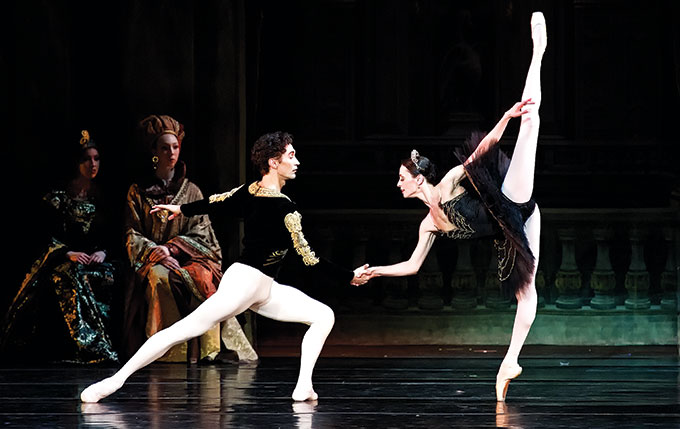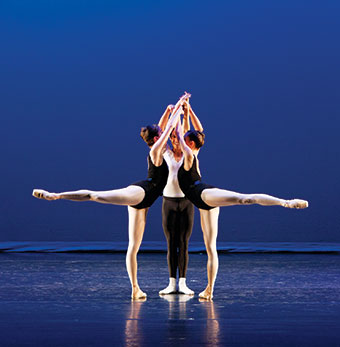A Dance in the Moonlight
by Geoff Kelly

With Shea’s and the BPO, Neglia Ballet Artists presents Swan Lake and Balanchine’s Serenade
Next Friday, May 25, Neglia Ballet Artists presents the latest in a fruitful series of collaborations with Shea’s Performing Arts Center and the Buffalo Philharmonic Orchestra: an evening of Tchaikovsky, including the second half of Swan Lake and George Balanchine’s masterpiece, Serenade.
The program presents several rare opportunities. First and foremost, it is unusual that a ballet company such as Neglia is able to forge a partnership with a high-caliber orchestra such as the BPO. Scant (and growing scanter) financial support for the arts means that most companies of Neglia’s size must rely on recorded music for their performances. In Buffalo, we are more fortunate, as we are on so many cultural fronts: Over several years, Neglia and the BPO have worked together on numerous occasions, at several venues, presenting both classical and modern ballet as its choreographers and composers intended for it to be seen and heard.
“For me, with such a small company, to have a live orchestra is a privilege,” says Sergio Neglia, the company’s artistic director. “Imagine, to perform with such high-class musicians—it’s like a dessert, a special dessert.”
Neglia and his partner, Heidi Halt, the company’s executive director, sought to collaborate with the BPO for many years. “But somehow it didn’t seem to click,” Neglia says.
What did click, Halt says, was a breakfast meeting about seven years ago between Neglia and JoAnn Falletta, the BPO’s music director, arranged by the BPO’s board chair, James Newman. Falletta immediately embraced the idea of working with Neglia Ballet Artists, as did BPO’s new executive director, Dan Hart. A series of productions (Spartacus, Swan Lake among them) at Artpark followed. Four years ago, as the BPO and Shea’s partnered to bring in an out-of-town company’s production of The Nutcracker, Neglia and Halt told Hart that there was no reason that Neglia could not mount its own production of the holiday classic—with the BPO, at Shea’s. Hart said he thought so, too.
“I said how about we stop thinking about it and get onstage and do it,” Neglia says. Thanks in part to funding from the John R. Oishei Foundation, the project came to fruition in November 2009; the production has been reprised twice since, with growing success. Last year, Neglia added a production of Romeo and Juliet at Shea’s with the BPO—the first time any ballet company, local or otherwise, had mounted more than one full-scale production with the BPO in a single year.

“When people see our Nutcracker, they see a full professional company—even though we don’t really have a full professional company,” Halt says. “We have really great principal dancers who we’ve worked with so much that they practically are Neglia dancers, even though they’re not. They’ve been in nearly every production we’ve done. They love coming here; they love working with Sergio. It’s really professional and really serious.”
Several of those regulars are taking part in next Friday’s program. Silvina Vaccarelli, an Argentinean dancer who paired with Neglia in last year’s Romeo and Juliet, returns to dance the role of Odette opposite Neglia’s Seigfried in Swan Lake. They will perform principal roles in Serenade, as well, along with Lithuanian dancers Vilia Putrius and Mindaugas Bauzys. Viktor Plotnikov, formerly of the Boston Ballet, is ballet master for Swan Lake; Serenade is staged by Deborah Wingert of Studio Maestro in New York City. Wingert, who was a student with Neglia when both were teenagers, was chosen by Balanchine at age 16 to join the New York City Ballet, where she spent 15 years. She is one of a small group of artists selected by the fiercely protective Balanchine Trust to set his choreography.
“It’s a pretty big deal that we got the rights to perform Serenade based on the quality of our work,” Halt says.
Serenade is the first full-length piece that Balanchine created after arriving in the United States, and the first of many he choreographed to the music of Tchaikovsky. Conceived as a lesson in stage technique—Balanchine even incorporated unexpected events at rehearsals into the piece—it was first performed by students of the School of American Ballet for 250 guests of the banker Felix Warburg in 1934. The official premiere took place a year later, and it immediately broke new ground in dance, especially American dance, establishing Balanchine as a conduit between the world of classical ballet and all that was new and modern.
“This is one of the first pieces Balanchine made,” Neglia says, “and, for the 1930s, well ahead of its time. It is a very powerful piece.”
In an essay for next week’s program, Wingert recalls the last time she danced in Serenade, in the emotionally charged weeks following September 11, 2001:
The opening moments of Serenade tell every dancer’s story. It begins with the moonlight, and then there is first position. She takes a breath, gathers herself into fifth position, and makes a decision: “It’s all for you.” Seventeen dancers open themselves to the audience, and then turn their hearts to the heavens. It is a moving image, often sighed over by audiences and dancers alike. In Seattle, 10 years ago, we didn’t even get that far.
The curtain had only to open, night after night in those late September weeks, and the wave of fresh air that drifted across from the audience would bring with it audible, tremulous gasps—and also sobs. And we, not yet having moved at all, still standing in formation with our faces and hands raised to the “moon,” we also had goose-bumps, and our eyes were filled with tears.
For tickets to next Friday’s performance of Serenade and Swan Lake, call 1-800-745-3000, visit www.ticketmaster.com, or go to the Shea’s ticket office. Tickets are $25-$65.
blog comments powered by Disqus|
Issue Navigation> Issue Index > v11n20 (Week of Thursday, May 17) > A Dance in the Moonlight This Week's Issue • Artvoice Daily • Artvoice TV • Events Calendar • Classifieds |









 Current Issue
Current Issue